- Home
- Michael Swanwick
Stations of the Tide Page 2
Stations of the Tide Read online
Page 2
“Absolutely.” The illusionist’s eyes glittered. “It’s this: Gregorian is going to be a very difficult man to catch. He’s a magician, you see, and native to the Tidewater. He can change his own form, or that of his enemy, whichever he pleases. He can kill with a thought. More importantly, he understands the land here, and you don’t. He can tap its power and use it against you.”
“You don’t actually believe that Gregorian is a magician? That he has supernatural powers, I mean.”
“Implicitly.”
In the face of that fanatical certainty, the bureaucrat did not know what to say. “Ahem. Yes. Thank you for your concern. Now, what say we get down to business?”
“Oh yes, sir, immediately, sir.” The young man touched a pocket, and then another. His expression changed, grew pained. In an embarrassed voice he said, “Ah… I’m afraid I left my materials in the forward stowage. If you would wait?”
“Of course.” The bureaucrat tried not to be pleased by the young man’s obvious discomfort.
With Chu gone, the bureaucrat returned to his contemplation of the passing forest below. The airship soared and curved, dipped its nose and sank low in the air. The bureaucrat remembered his first sighting of it back in Port Richmond, angling in for a docking. Complex with flukes, elevators, and lifting planes, the great airship somehow transcended the antique awkwardness of its design. It descended slowly, gracefully, rotor blades thundering. Barnacles covered its underbelly, and mooring ropes hung from its jaws like strings of kelp.
A few minutes later the Leviathan docked at a heliostat tower at the edge of a dusty little river town. A lone figure in crisp white climbed the rope ladder, and then the heliostat cast off again. Nobody debarked.
The lounge door opened, and a slim woman in the uniform of internal security entered. She strode forward, hand extended, to offer her credentials. “Lieutenant-Liaison Emilie Chu,” she said. Then, “Sir? Are you quite all right?”
2. Witch Cults of Whitemarsh
Gregorian kissed the old woman and threw her from the cliff. She fell toward the cold gray water headfirst, twisting. There was a small white splash as she hit, plunging deep beneath the chop. She did not surface. A little distance away, something dark and sleek as an otter broke water, dove, and disappeared.
“It’s a trick,” the real Lieutenant Chu said. On the screen Gregorian’s face appeared: heavy, mature, confident. His lips moved soundlessly. Be all that you were meant to be. The bureaucrat had killed the sound after the fifth repetition, but he knew the words by heart. Give up your weaknesses. Dare to live forever. The commercial ended, skipped to the beginning, and began again.
“A trick? How so?”
“A bird cannot change into a fish in an instant. That kind of adaptation takes time.” Lieutenant Chu rolled up her sleeve and reached into the fishbowl. The sparrowfish jerked away, bright fins swirling. Dark sand puffed up, obscuring the tank for an instant. “The sparrowfish is a burrower. It was in the sand when he thrust the rainbird into the water. One quick movement, like this,” she demonstrated, “and the bird is strangled. Plunge it into the dirt, and simultaneously the fish is startled into swimming.”
She set the small corpse down on the table. “Simple, when you know how it’s done.”
Gregorian kissed the old woman and threw her from the cliff. She fell toward the cold gray water headfirst, twisting. There was a small white splash as she hit, plunging deep beneath the chop. She did not surface. A little distance away, something dark and sleek as an otter broke water, dove, and disappeared.
The bureaucrat snapped off the television.
The government liaison leaned straight-backed against a window, the creases of her uniform imperially crisp, smoking a thin black cigarillo. Emilie Chu was thin herself, a whippet of a woman, with cynical eyes and the perpetual hint of a sneer to her lips. “No word from Bergier. It appears my impersonator has escaped.” She stroked her almost-invisible mustache with cool amusement.
“We don’t know that he’s gone yet,” the bureaucrat reminded her. The windows were clear now, and in the fresh, bright air the encounter with the false Chu seemed unlikely, the stuff of travelers’ tales. “Let’s go see the commander.”
The rear observatory was filled with uniformed schoolgirls on a day trip from the Laserfield Academy, who nudged each other and giggled as the bureaucrat followed Chu up an access ladder and through a hatch into the interior of the gas bag. The hatch closed, and the bureaucrat stood within the triangular strutting of the keel. It was dark between the looming gas cells, and a thin line of overhead lights provided more a sense of dimension than illumination. A crewman dropped to the walkway before them. “Passengers are not—” She saw Chu’s uniform and stiffened.
“Commander-Pilot Bergier, please,” the bureaucrat said.
“You want to see the commander?” She stared, as if he were a sphinx materialized from nothing to confront her with a particularly outrageous riddle.
“If it isn’t too much trouble,” Chu said with quiet menace.
The woman spun on her heel. She led them through the gullet of the airship to the prow, where stairs so steep they had to be climbed on all fours like a ladder rose to the pilothouse. On the dark wooden door was the faintest gleam of elfinbone inlay forming a large, pale rose-and-phallus design. The crewman gave three quick raps, and then seized a strut and swung up into the shadows, as agile as any monkey. A deep voice rumbled, “Enter.”
They opened the door and stepped within.
The pilothouse was small. Its windshield was shuttered, leaving it lit only by a triad of navigation screens to the fore. It had a lived-in smell of body sweat and stale clothing. Commander Bergier stood hunched over the screens, looking like an aging eagle, his face a pale beak, suddenly noble when he raised his chin, a scrawny-bearded poet brooding over the bright terrain of his world. Turning, he raised eyes fixed on some distant tragedy more compelling than present danger could ever be. Two dark cuplines curved under each eye. “Yes?” he said.
Lieutenant Chu saluted crisply, and the bureaucrat, remembering in time that all airship commanders held parallel commissions in internal security, offered his credentials. Bergier glanced down at them, handed them back. “Not everyone welcomes your sort on our planet, sir,” the commander said. “You keep us in poverty, you live off our labor, you exploit our resources, and you pay us with nothing but condescension.”
The bureaucrat blinked, astonished. Before he could frame a response, the commander continued, “However, I am an officer, and I understand my duty.” He popped a lozenge into his mouth and sucked noisily. A rotten-sweet smell filled the cabin. “Make your demands.”
“I’m not making any demands,” the bureaucrat began. “I only—”
“There speaks the voice of power. You maintain a stranglehold on the technology that could turn Miranda into an earthly paradise. You control manufacturing processes that allow you to undercut our economy at will. We exist at your whim and sufferance and in the form you think good. Then you walk in here carrying this whip and making demands you doubtless prefer to call requests and pretend it is for our own good. Let us not cap this performance with hypocrisy, sir.”
“Technology didn’t exactly make an ‘earthly paradise’ of Earth. Or don’t they teach classical history here?”
“The perfect display of arrogance. You deny us our material heritage, and now you have as good as asked me to thank you for it. Well, sir, I will not. I have my pride. And I—” He paused. In the sudden silence it was observable how his head nodded slightly at irregular intervals, as if he fought off sleep. His mouth opened and shut, opened and shut again. His eyes slid slowly to the side in search of his lost thought. “And, ah. And, ah—”
“The illusionist,” the bureaucrat insisted. “Lieutenant Chu’s impersonator. Have you found him yet?”
Bergier straightened, his fire and granite restored. “No, sir, we have not. We have not found him, for he is not here to be found. He has left
the ship.”
“That’s not possible. You docked once, and nobody debarked. I was watching.”
“This is a seaward flight. It is all but empty. On the landward run, yes, perhaps an agile and determined man could evade me. But I have accounted for every passenger and had my crew open every stowage compartment and equipment niche in the Levi. I went so far as to send an engineer with an airpack up the gas vents. Your man is not here.”
“It’s only logical he’d’ve secured his escape beforehand. Maybe he had a collapsible glider hidden forward,” Chu suggested. “It wouldn’t have been difficult for an athletic man. He could have just opened a window and slipped away.”
More likely, the bureaucrat thought, and the thought struck him with the force of inevitability, more likely he had simply bribed the captain to lie for him. That was how he himself would’ve arranged it. To cover his suspicion, he said, “What bothers me is why Gregorian went to all this trouble to find out how much we know about him. It hardly seems worth his effort.”
Bergier scowled at his screens, said nothing. He touched a control, and the timbre of one engine changed, grew deeper. Slowly, slowly the ship began to turn.
“He was just baiting you,” Chu said. “Nothing more complicated than that.”
“Is that likely?” the bureaucrat said dubiously.
“Magicians are capable of anything. Their thinking isn’t easy to follow. Hey! Maybe that was Gregorian himself? He was wearing gloves, after all.”
“Pictures of Gregorian and of our impersonator,” the bureaucrat said. “Front and side both.” He removed them from his briefcase, shook off the moisture, laid them side by side beside the screens. “No, look at that — it’s absurd to even contemplate. What does his wearing gloves have to do with anything?”
Chu carefully compared the tall, beefy figure of Gregorian with the slight figure of her impersonator. “No,” she agreed. “Just look at those faces.” Gregorian had a dark, animal power, even in the picture. He looked more minotaur than man, so strong-jawed and heavy-browed that he passed through mere homeliness into something profound. His was the sort of face that would seem ugly in repose, then waken to beauty at the twitch of a grin, the slow wink of one eye. It could never have been hidden in the pink roundness of the false Chu’s face.
“Our intruder wore gloves because he was a magician.” Lieutenant Chu wriggled her fingers. “Magicians tattoo their hands, one marking for each piece of lore they master, starting from the middle finger and moving up the wrist. A magus will have ’em up to the elbows. Snakes and moons and whatnot. If you’d seen his hands, you’d never have mistaken him for a Piedmont official.”
Bergier cleared his throat and, when they both turned to him, said, “With the technology you deny us, a single man could operate this ship. Alone, he could manage all functions from baggage to public relations with nary a crewman under him.”
“That same technology would make your job superfluous,” the bureaucrat pointed out. “Do you think for an instant that your government would pay for an expensive luxury like this airship if they could have a fleet of fast, cheap, atmosphere-destroying shuttles?”
“Tyranny always has its rationale.”
Before the bureaucrat could respond, Chu interjected, “We’ve located Gregorian’s mother.”
“Have we?”
“Yes.” Chu grinned so cockily the bureaucrat realized this must be something she had dug up on her own initiative. “She lives in a river town just below Lightfoot. There’s no heliostat station there, but if we can’t find somebody to rent us a boat, it’s not a long walk. That’ll be the best place to start our investigation. After that we’ll tackle the television spots, see if we can trace the money. All television is broadcast from the Piedmont, but if you want to follow up on the ads, there’s a gate at the heliostat station, that’s no problem.”
“We’ll visit the mother first thing tomorrow morning,” the bureaucrat said. “But I’ve dealt with planetside banks before, and I very seriously doubt we’ll be able to follow the money.”
Bergier looked at him scornfully. “Money can always be traced. It leaves a trail of slime behind it wherever it goes.”
The bureaucrat smiled, unconvinced. “That’s very aphoristic.”
“Don’t you dare laugh at me! I had five wives in the Tidewater when I was younger.” Bergier popped another lozenge, mouthed it liquidly. “I had them placed where they could do the most good, spaced out along my route distant enough that not one suspected the existence of the others.” The bureaucrat saw that the commander did not observe how Chu rolled her eyes when he said this. “But then I discovered that my Ysolt was unfaithful. It drove me half mad with jealousy. That was not long after the witch cults were put down. I returned to her that day after an absence of weeks. Oh, she was hot. Her period had just begun. The whole house smelled of her.” His nostrils flared. “You have no idea what she was like at such times. I walked in the door, and she slammed me to the floor and ripped open my uniform. She was naked. It was like being raped by a whirlwind. All I could think was that we must avoid scandalizing the neighbors.
“It would have made a fish laugh to see me struggling beneath that little hellcat, I should imagine. Red-faced, half-undressed, and flailing out with one arm to close the door.
“Well and good. I was a young man. But the things she did to me! From somewhere she had acquired skills I had not taught her, ideas that were not mine. Some of them things such as I had never experienced. We had been married for years. Now, all at once, she had acquired new tastes. Where had she learned them, hey? Where?”
“Maybe she read a book,” Chu said dryly.
“Bah! She had a lover! It was obvious. She was not a subtle woman, Ysolt. She was like a child, showing off a new toy. Why don’t we see what happens if, she said… Let’s pretend you’re the woman and I’m the man … This time I’m not going to move at all, and you can… It took her hours to demonstrate everything she had learned — ‘thought of’ she said — and I had a lot of time to mull over what I should do.
“It was dark when I left her. She was sleeping it off, her long black hair sticking to her sweaty little breasts. What an angelic smile she had! I went out to discover who had cuckolded me, and I brought along a gun. He would not be difficult to find, I determined. A man with such skill as Ysolt mirrored would be known in the right quarters.
“I went down to the riverbank, to the jugs and paintpots, and asked a few questions. They said yes, a man with the kind of skill I described had been through recently.” A hidden speaker mumbled respectfully, and Bergier touched the controls. “Trim the port aerostat manually if you have to. Yes. No. You have your orders.” He was silent for a long, forlorn moment, and the bureaucrat thought he had lost the thread of his tale. But then he began again.
“But I could not find the man. Everyone had heard of him — word had gone round like the latest dirty joke — and many hinted they had slept with him, but he was not to be found. There were a lot of odd types afoot in those days, after the suppression of Whitemarsh, and a sex-artist was the least of them. I learned that he was of moderate size, polite dress, wry humor. That he spoke little, lived off the largess of women, had dark eyes, rarely blinked. But the river lands swarmed with people who had something to hide. A cautious man could hide there forever, and he was the most evasive creature in the world. He moved unseen and unnoted through the night world, made no promises, had no friends, established no rhythms. It was like punching empty air! He was not to be found.
“After a few days, I changed my tactics. I decided Ysolt should find him for me. So I made myself impotent. You understand how? With my fist. Old Mother Hand and her five daughters. By the time Ysolt got to me, there was nothing could make the old soldier stand erect for her. It drove her to distraction. And I, of course, feigned embarrassment, humiliation, distress. After a time I simply refused to try.
“Sure enough, she was driven back to her lover, to this man of extraordinar
y skill and knowledge. She returned to me with breathing exercises and relaxation techniques that ought to have worked, but did not. All this time, I acted cold and distant toward her. It was only natural she would assume that I was blaming her for my disability. By the time the corps called me back to duty, she was ready to do anything to effect my cure.
“When next I returned, she had ‘discovered’ a man who could aid me in my distress. She knew I didn’t approve of the witch cultists. But he could prepare a potion for me. It would cost a great deal. She did not like that part. A man should not charge for such a thing. But a husband’s happiness was so important to his wife… … She finally persuaded me.
“That night I filled a small, heavy box with silver and went as directed to a small garage just below the docks. There was a blue light over the side door. I went in.
“The minute the door closed, someone threw on every light in the place. My eyes crawled. Then the bright sting of vision resolved into automobiles, racks of grease guns, welding tanks. There were six waiting for me, two of them women. They sat in truck cabs and atop hoods, looking at me with unfriendly eyes, as unblinking as owls.”
The speaker murmured again, and Bergier jerked his head to the side. “Why are you bothering me with this? I don’t want to be disturbed with routine.” Then, returning to his story, “One of the women asked to see my money. I opened my box, took out a moleskin bag containing eighty fleur-de-vie dollars, and threw it at her feet. She untied the bag, saw the flash of mint silver, and drew in her breath. This came from Whitemarsh, she said.
“I said nothing.
“The cultists traded glances. I slid a hand inside my coat and clutched my revolver. We need the money, a man said. The government dogs are slavering over our shoulders. I can smell their filthy breath.
“The woman held up a handful of silver, flashing like so many mirrors. There was a coinmaker disappeared just before the rape of Whitemarsh, she said. They took his stock and gave it away to whoever wanted it. I was there, but felt I didn’t need it. She shrugged. How quickly things change.

 The New Prometheus
The New Prometheus The Iron Dragon’s Mother
The Iron Dragon’s Mother The Mongolian Wizard Stories
The Mongolian Wizard Stories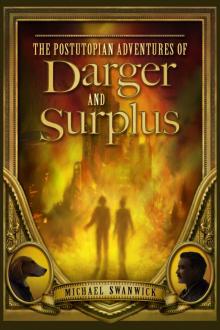 The Postutopian Adventures of Darger and Surplus
The Postutopian Adventures of Darger and Surplus Day of the Kraken
Day of the Kraken Cold Iron
Cold Iron Murder in the Spook House: A Tor.com Original
Murder in the Spook House: A Tor.com Original Radio Waves
Radio Waves The New Prometheus: A Tor.com Original
The New Prometheus: A Tor.com Original Stations of the Tide
Stations of the Tide Vacuum Flowers
Vacuum Flowers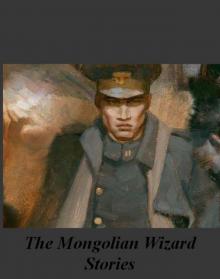 The Mongolian Wizard Stories (online stories 1-7)
The Mongolian Wizard Stories (online stories 1-7) The Dragons of Babel
The Dragons of Babel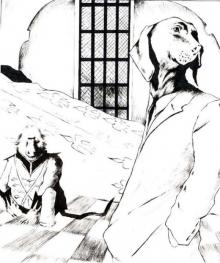 The Dog Said Bow-Wow
The Dog Said Bow-Wow Griffin's Egg
Griffin's Egg The Best of Michael Swanwick
The Best of Michael Swanwick Not So Much, Said the Cat
Not So Much, Said the Cat In the Drift
In the Drift Vacumn Flowers
Vacumn Flowers Slow Life
Slow Life The Wisdom Of Old Earth
The Wisdom Of Old Earth Legions In Time
Legions In Time Scherzo with Tyrannosaur
Scherzo with Tyrannosaur The Year's Best Science Fiction (2008 Edition)
The Year's Best Science Fiction (2008 Edition)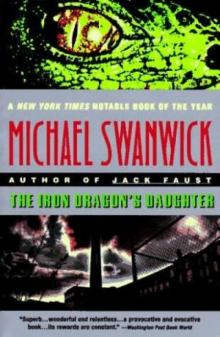 The Iron Dragon's Daughter
The Iron Dragon's Daughter The Very Pulse of the Machine
The Very Pulse of the Machine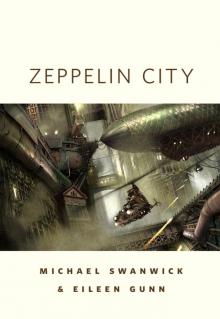 Zeppelin City
Zeppelin City Dancing with Bears
Dancing with Bears Bones of the Earth
Bones of the Earth Tales of Old Earth
Tales of Old Earth Trojan Horse
Trojan Horse Radiant Doors
Radiant Doors